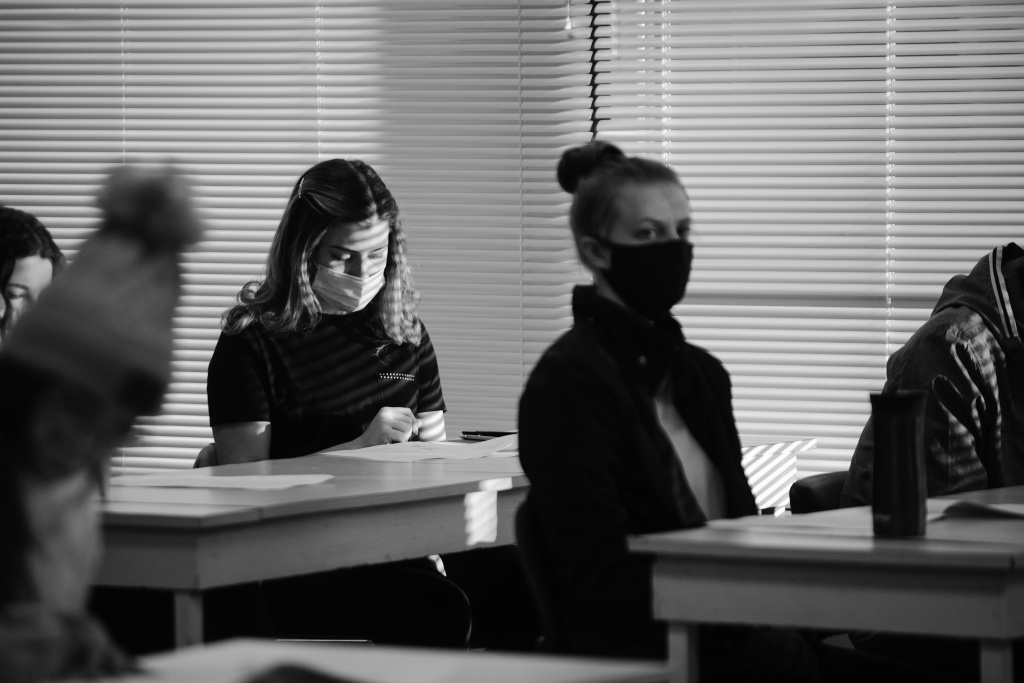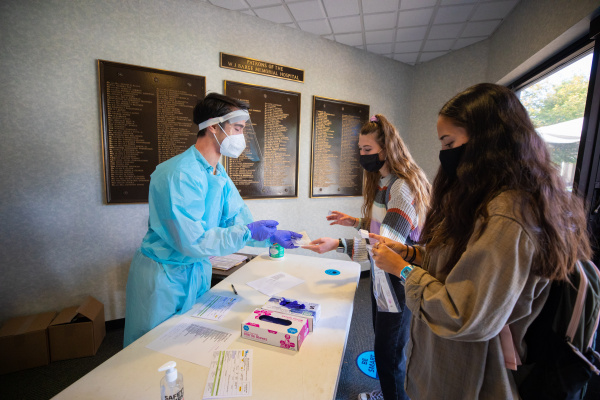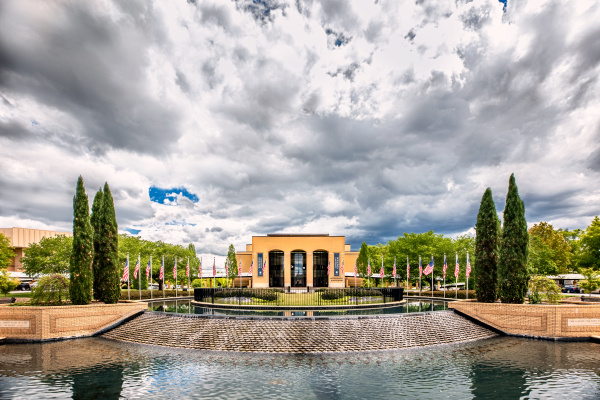Living through the COVID-19 pandemic has been difficult, but the BJU community has also seen God’s goodness and provision in the year since the novel coronavirus first impacted the campus.
The opening lines of Charles Dickens’ novel A Tale of Two Cities could easily have described the pandemic as well as it did the era before the French Revolution. “It was the best of times, it was the worst of times, … it was the season of Light, it was the season of Darkness, it was the spring of hope, it was the winter of despair, we had everything before us, we had nothing before us … .” It is ironically fitting that BJU is presenting the musical adapted from the novel at the one-year anniversary of the University’s pivot to online education.
“I remember the day I left,” said Dr. Darren Lawson, dean of the School of Fine Arts and Communication and director of the musical A Tale of Two Cities. “I packed up all of my A Tale of Two Cities materials, my teaching, and I remember putting them in my leather bag, and I remember staring at that bag thinking, I don’t know when I’m coming back to the office.
“So, it’s been a long year, but I’m really thankful that God gave us the strength and the perseverance to make it through. It was a test of our faith. It was a test of our patience, but we did it. I’m really proud of the students. I’m really proud of my faculty and staff, and I’m thankful that bag is back now, and everything is back on the desk.”
Lawson isn’t the only one rejoicing to have things back where they belong. Students are grateful to have less uncertainty and to be back at BJU with friends.
A Place to Call Home
Perhaps the group who initially faced the most uncertainty last spring were the international students. “They asked us to stay for a meeting because the first thing that comes to mind is our visas because one of the requirements for visas is no online classes,” said Marce Martinez, an electrical engineering student from Honduras. “We didn’t know if we were going to lose our visas, and the school was like, ‘Well, we basically called this meeting to say we don’t know either.’ … Even after everybody else went home, we stayed here a few days, and we just didn’t know what to do.”
After an exemption was made for international student visas to include online classes due to the novel coronavirus protocols, the remaining international students on campus were also sent home. “They told us we had to leave the country right away, which was a problem because Honduras had closed its borders like that day, so we couldn’t leave,” said Ricardo Donado, now a senior actuarial student. He and his cousin Miguel Lopez, a current senior business administration student, were able to stay with family in Atlanta. “Thankfully the Lord gave us a place to stay,” said Donado.
A Summer of Being Stretched
Another group who faced uncertainty were the summer camp workers. “The summer was difficult, too, not really ever knowing when I was, if I was going to be able to work at camp, but already signing my contract, so I didn’t know when I would be there,” said Emily Clements, now a junior graphic design student.
“We were there for four weeks. Right in the middle of summer, towards the end of June into the beginning of July … after the third week of having campers, they had to close for the rest of the summer.”
A “social person,” Clements said she struggled with being home alone most of the day while her parents were at work. “But with that God stretched me a lot, and it was cool to see because my sister was at home, and it was the last little bit I got with her before she got married and moved away. So it was cool that I was able to spend the last couple months with her being home before we all kind of went our different ways.”
Blessing in Disguise
Ministry teams on the road during the 2020 spring semester also faced unique challenges. The 2020 technology ministry team was in the Pennsylvania and New York area about the time when the COVID-19 outbreak began. Elisabeth Parks, current sophomore cybersecurity student and member of the team, recalled that schools began canceling engagements. “You can’t have a ministry tour if there is no one to minister to,” she said. “So our situation was kind of up in the air.”
When the BJU administration sent students home to continue online, the ministry team was also pulled off the road. “We were pulled off early, so we weren’t really (ready). We didn’t have flights planned. We didn’t have anything. Like most other students here, you weren’t expecting to be sent home early. And we also weren’t expecting COVID to become such a big deal that it would impact us that way. … Tour was cut short by approximately seven weeks, and that was harder on us, but in talking to another team member, they said that they wondered what God was having us stop from, like what could have happened if we stayed on tour that He sent a whole pandemic to make us go home. …
“There’s a lot of what-ifs if we had stayed on the road, but the turnaround of coming back home early, and the Lord definitely provided for me. I feel like I’ve actually benefited from COVID so far, just the early summer, and the Lord has really been blessing me through this. For many other people, that’s not the case. But I feel like He’s blessed me through all of this.”
Loss Hits Home
Parks was right in saying that not everyone has benefited as she has from the COVID-19 pandemic. In fact, more have suffered loss. One such is the of the Division of Communication, Dr. Mary Mendoza, who lost her father without being able to say goodbye. When asked to reflect on the last year, however, Mendoza’s first thought is not just of her own loss.
“In thinking about the last year, immediately I think about a lot of loss,” she said. “Loss of life, loss of (finances) or even social events. But that loss is also matched up with seeing God’s goodness at the same time. So, if I reflect back on the last year, I would say that it’s a mixture of a lot of loss and yet a lot of gain, as well.
“If I would add anything to that statement, it would be the fact that I experienced a lot of new things. Kids at home studying and learning all kinds of virtual technology that we had to adapt to. …
“With the loss, there has been new gains. The loss is hard. Immediately when it happened last year, that’s all I could think of. People losing graduation ceremonies. … People losing normal activities. My daughter stopped playing with her team, and she was so excited about playing soccer. But then we started hearing about people losing their lives. My own dad passed away while he had COVID. So, you know, that’s real, but at the same time you see God’s goodness, and He’s given us that ability to continue life for those whom He chooses to give life to, and yet also blessings despite all the loss.”
A Health Sciences Perspective
Dr. Amy Hicks, chair of the Division of Health Sciences, said that as an institution BJU has weathered the last year well. “As an academic institution, we have done very well with our response, with students abiding by protocols to let us to keep in class. Many of us were discouraged at having to finish up the semester last (year) without being together. The students were really compassionate. They worked hard to keep us all in class here. And so for that, we did well.”
See Also: De-escalation of Protocols Based on Careful Consideration
Hicks was careful, though, to emphasize this year has been very difficult for many. “People have had different kinds of struggles this year,” she said. “So it’s a little bit of a touchy thing to make a generalization about how things have gone.”
Health sciences faculty member and director of the Center for Community and Global Health Dr. Bernard Kadio said that the biggest lesson he has learned in the last year is to keep a vertical perspective. “Whenever we lose that vertical perspective, then the horizontal perspective becomes dimmer, more obscure, (less certain) until you have that vertical dimension, and then it kind of becomes, ‘Oh, put things in perspective. It’s another event. We’ll get through this, and we might get through this stronger even,’” said Kadio. “So to me, that’s probably one of the lessons that also we learned. Not only as a Christian institution but also as individual believers through such a time as this one.”
Hicks agreed with Kadio and followed up by emphasizing how important to mental health maintaining the “vertical mind” is: “I think it’s been very easy to get our eyes on our circumstances and to begin to lose hope and to feel anxious. And when we keep that vertical mind in view, it gives us a reminder that God has controlled world events before, and He’ll control world events now.”








